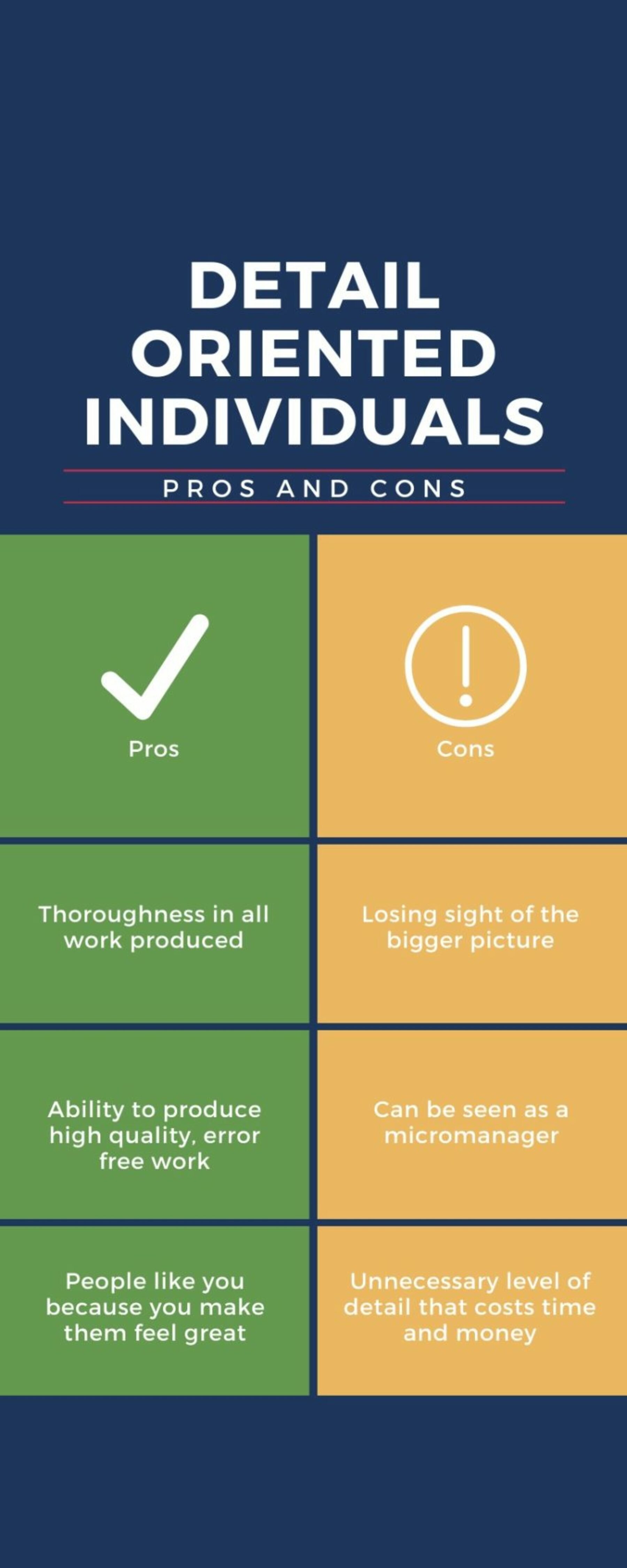What does it mean to be detail oriented
Someone who is detail-oriented is the type of person who possesses extreme attention to detail. Their thinking process is inherently thorough and as a result, they tend to be highly accurate, organized, and even pedantic.
Companies and recruiters often look for an individual who is considered detail-oriented. This is because there are many benefits of having an individual who naturally or skillfully operates at a higher level of attention to detail. While there is a lot of value that detail oriented individuals bring to an organization, there are also pitfalls that can be costly to an organization. Leaders and managers should be aware of who on their team are detail oriented and employ the right tactics to manage them.
Key takeaways
- Detail oriented individuals exercise high attention to detail which manifests in their work and personal life
- Organized, precise, punctual, and pedantic are some common characteristics of detail oriented individuals
- Managers should take note of detail oriented team members to ensure they keep the bigger picture
5 signs and habits of a detail oriented person
Detail oriented individuals have habits that permeate into their work. Some telltale signs that someone is detail oriented include:
1. They care a lot about grammar and spelling – one of the most obvious signs is if the person points out grammatical and spelling mistakes. If the individual has a strong command of English and attention to detail, they will pour over mistakes and spelling, as anything that seems out of place in a body of text will immediately feel off to them.
2. They ask lots of questions – in the quest for more details, these individuals will ask lots of questions. It is a natural part of their process to ask questions to piece together all the fine strokes of the bigger picture.
3. They are observant of body language and social cues – someone who is detail oriented will pick up on all the non-verbal cues of those around them. Accordingly, this allows for these individuals to act empathetically as they can pick up on how others actually and respond appropriately.
4. They are organized – another habit exhibited by detail oriented individuals is they are highly organized. This may be a by-product of the fact that they collect so many details, that they must have a system to manage all the information. By having such a tendency it affords the individuals other things, such as always being prepared.
5. They are punctual and prepared – a likely result of being highly organized, detail oriented individuals are always prepared. They leverage their organization and or systems they used to stay organized to help them stay on top of their responsibilities, and they value the sense of place that being on time brings, as it allows them to stick to a timeline or bigger plan.
Advantages and pitfalls of being detail oriented at work
Detail oriented employees (or people that score High Conscientious on the DISC assessment) bring a lot of value at work. However, there are also scenarios where being too far in the weeds yields diminishing returns. It is important for managers, and even employees, to recognize when and where high attention to detail is needed most and when it needs to be managed.
Advantages
- Thoroughness – thoroughness may be imperative depending on the type of work. Doctors as an occupation is a great example of where thoroughness is imperative; you probably don’t want to go under the knife of a doctor who is not considered thorough.
- High-quality work – the more detail oriented you are, the more likely your work is of higher quality and free of errors. This is valuable as the quality of deliverables is a direct reflection of you as an employee and upon the greater company.
- You make people feel good – having the ability to remember details, such as someone’s birthday or their allergies, and actioning on it will make them feel good. The perception will be that you care about them, allowing you to build a stronger relationship with that individual. This can be a great skill for connecting with colleagues, managers, and clients.
Pitfalls
- Losing sight of the bigger picture –being detail oriented can lead to analysis paralysis which can stall an important project or go down an unnecessary rabbit hole. In these cases, the level of detail is actually counterproductive.
- Micromanaging – being detail oriented as a leader can potentially earn you a reputation of being a micromanager. Pointing out details, both good and bad, can be taken by employees as feedback, regardless if what was your intention. A high frequency of this behaviour can be seen as overbearing.
- High cost – ultimately being detail oriented to a level that is unnecessary for your role will cost yourself and the company more money. This can be taxing for an individual as well, as it requires the person to engage in work that brings those details into their deliverables. It can also cause the wrong reaction if your team or manager does not care about the details as much as you. If you’re doing consulting work, a high level of detail may also come at an extra cost that clients do not want to pay for.

Steps for becoming more detail oriented
If you are not inherently detail oriented, there are tips and tricks you can use to build the habits that support attention to detail. Below are steps to take as a loose framework for building detail-oriented habits:
- Identify the scope – decide where in your life you want to improve your attention to detail. Is this at work? Is this with your partner? Narrowing the scope will allow you to focus on building specific habits and allow for incremental improvement while making the overall process less daunting.
- Create checklists – create a list of all the things you need to step through in order to consider a task or project completion. For example, if you are a grant proposal writer, list all the things that need to be in good standing before the proposal is sent off. Have a coworker vet the checklist to ensure you’ve covered all the tasks. Then go through the checklist each time you write a proposal. Doing this will force you to review your work before handing it in.
- Take notes – in a meeting, jot down notes on paper with a pen so you can review them after. The trust his most people have terrible memories. Taking notes will allow you to capture any important details and doing it by hand will also force you to pay attention.
- Review your notes – making a habit of reviewing meeting notes will allow you to review important pieces of information and action on follow-up items. When done proactively, managers and colleagues perceive you to be competent and organized.
- Extrapolate your habits to other areas in your life – once you have some baseline habits built, try applying detail oriented practices in other aspects of your life. You may have to alter the techniques in order to get the same output, but so long as you have a list you should be able to leverage this across all areas.
